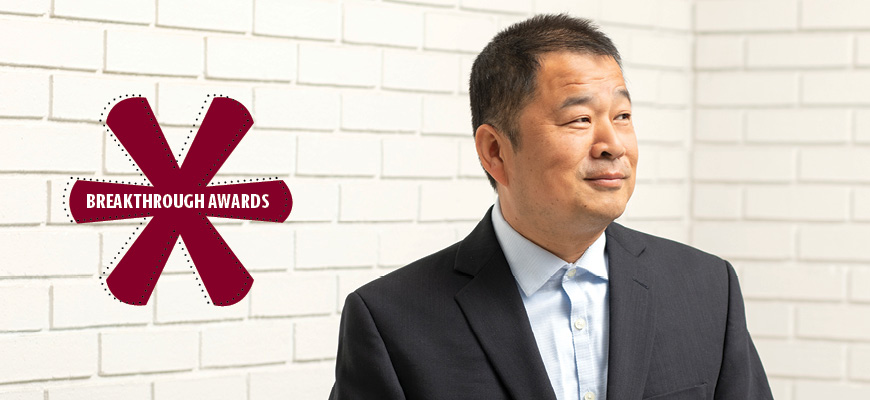
Breakthrough Star: Zhengqing Fu
Biological sciences professor, researcher looks for new ways to protect plants from pathogens
Posted on: April 6, 2020; Updated on: April 6, 2020
By Craig Brandhorst, craigb1@mailbox.sc.edu, 803-777-3681
Imagine, if you can, a world without oranges. A world without watermelon. A world without — well, pick a fruit, any fruit. Or pick a vegetable. When plant pathogens strike, unchecked, the results on agriculture can be devastating.
Luckily, researchers like University of South Carolina associate professor of biological sciences Zhengqing Fu are on the case. Fu, who received a 2020 Breakthrough Star award from the university’s Office of Research, has received more than $735,000 in extramural and intramural funding for projects aimed at curtailing plant pathogen infection.
At the most basic level, Fu is examining the relationship between salicylic acid and biotrophic and semi-biotrophic plant pathogens, including but not limited to those that attack citrus trees.
What’s exciting about my work is that it’s about mystery.
Zhengqing Fu, biological sciences professor
You may know salicylic acid as the active ingredient in aspirin. It is also a naturally occurring essential hormone in plant immunity — a plant’s primary defense against bacteria and other plant pathogens. Unfortunately for plants — and by extension, for humans — pathogens have clever ways of sidestepping these defenses.
As Fu explains, bacteria attach ubiquitin proteins to another protein, NPR1, which is a key salicylic acid receptor. Overwhelmed with ubiquitins, NPR1 begins to degrade. Once that happens, the plant ceases to receive salicylic acid signals telling it to turn on its defenses, leaving it susceptible to disease.
To help plants fight back, Fu is working on a number of approaches. One involves modifying lysine residue, an amino acid that ubiquitin attaches to before attacking NPR1. Without lysine as a vehicle, the ubiquitin has no means of reaching NPR1.
Another, similar approach is to develop non-degradable salicylic acid analogs— a hormone that functions the same way as the naturally occurring salicylic acid but that is unrecognizable to bacteria.
“The pathogens recognize salicylic acid,” says Fu. “If we can change the structure a little, we can make it active, but it will not be degraded.”
And in the case of citrus greening, Fu is looking at the literal root of the problem — by engineering a citrus greening resistant rootstock, which he hopes will bolster the plants’ defenses.
Identified as one of the most serious citrus plant diseases worldwide by the USDA, citrus greening is estimated to have infected between 80 and 90 percent of commercial orange trees in Florida. Infected trees produce smaller, misshapen fruit that drops prematurely from the tree; juice produced from such oranges is less sweet; and, ultimately, the trees die.
One of the major symptoms is root dieback, says Fu. If they can protect citrus rootstock, they can protect citrus plants.
“We introduced the salicylic acid receptor NPR1 into a new rootstock,” says Fu. “This will produce the antimicrobial proteins to kill citrus greening pathogens. Then we graft non-GMO scions on top. The fruit produced would not be considered GMO.”
For Fu, the research is as exciting as it is important.
“What’s exciting about my work is that it’s about mystery,” he says. “Plants face biotic and abiotic stress constantly. How plants deal with these stresses is an amazing field to explore. And if we don’t take care of plants, we all suffer.”